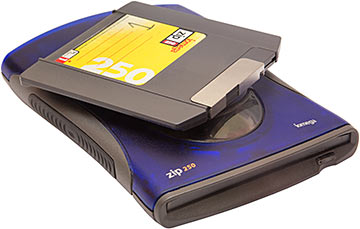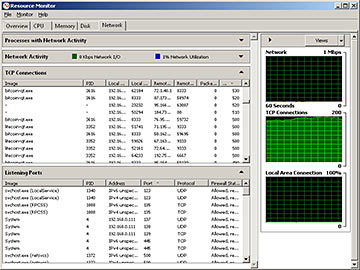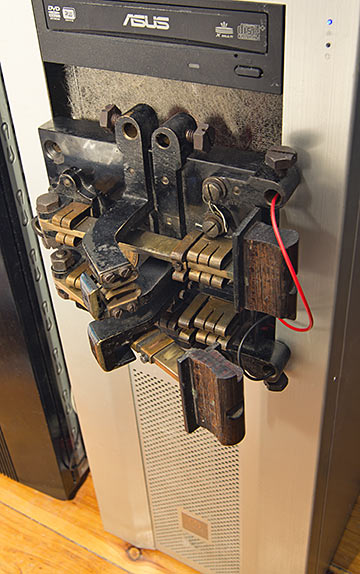
Atomic I/O letters column #148
Originally published 2013, in PC & Tech Authority(in which Atomic magazine is now a section)
Reprinted here March 3, 2014 Last modified 16-Jan-2015.
Give my computer... LIFE!
A friend of mine had the power button on his PC case break, so he went to The Shed whose contents have not been updated since before decimal currency and came back with a Bakelite light switch which he wired up and attached to the front of the case with sheet-metal screws, I presume because rivets left over from construction of the Harbour Bridge were not available.
He has to turn the switch on and then off again to get the computer to turn on, but it has the advantage that you don't have to hold it down if you want to do the six-seconds hard-power-off thing, you just flick the switch and wait.
I can't help but think that there must be some way in which this could go horribly wrong, and I know you like all disgusting computer hacks, so I thought I'd ask: What are the risks, here?
Christian
Answer:
There aren't any.
In the olden days before ATX, PC power supplies had integrated switches which switched mains power. Messing with those could be fatal. (Though if your pre-ATX computer's power switch failed, a properly-wired light switch would actually be a very good replacement.)
Modern PC power switches, though (and the reset and optional sleep switches, too), are low-voltage affairs connected to a little block of pins on the motherboard. You can perfectly safely replace them with a light switch, a doorbell button, a little DIP switch, sticky tape and aluminium foil, a mercury switch that requires you to lie the computer down and pick it back up again to turn it on, your car key bridging the mobo pins, whatever. If you connect other bits of the motherboard to each other in haphazard ways then you can endanger the hardware, but still not yourself.
The ATX control switches are meant to be momentary - only on when they're pressed down, not latching. But, as you say, you can just turn a non-momentary switch on and off again to get the same effect.
Provided success in this little hack doesn't encourage your friend to think he's now a fully qualified electrician, he and his hardware will come to no harm.
Plug and eventually play
It took me a while to figure this out, but when I plug a simple single-slot SD card reader into my Win7 x64 PC, it takes a really long time to recognise it. Like, 30 seconds or more. Then it works fine, but until I figured out what was going on I was driving myself crazy unplugging the reader and changing the cable and the USB socket I was using and so on before the magic 30-plus seconds had elapsed.
I also have a multi-card reader, though - SD, CF, Memory Stick, etc - which is recognised instantly the moment I plug it in. So I'm using that now.
Why the difference, though? Why do MORE slots get recognised FASTER?!
L.

In the unlikely event that you still have any working disks, you'll find Windows
still has drivers for USB Zip drives.
Answer:
Card readers and thumb-drives and external hard drives all show up as USB "Mass
Storage" devices. But the drivers for them are not actually one-size-fits-all.
USB "Human Interface Devices" - mice and keyboards - really do, I think, have only one driver that covers all of the basic features. But behind the scenes there are several different flavours of Mass Storage.
There's no very good reason why one driver should take a long time to get its act together and another shouldn't, but anything's possible when you're dealing with two-dollar Chinese card readers. So I can't really tell you why one driver is slow and the other - despite handling a lot more slots - isn't. But I would bet money that it's different drivers at fault.
(The built-in drivers of recent versions of Windows cover the most Mass Storage variations, so you'll seldom see such a device that Windows can't talk to. Linux and Mac users are more likely to be unable to use oddball USB storage devices.)
Locking yourself out
I put stuff in an encrypted Zip archive. I've got that archive really well backed up, including offsite via Mozy, and I was happy to know that my accounting files and other important things couldn't be snooped on by the work-experience kid at Mozy or whatever, but the password was long, and I do not know what it is any more.
This is where I do a 180 and say "Zip encryption is lame and easy to crack, right?"
Right?
Hunter
Answer:
Wrong.
A Zip archive encrypted with a short password can be brute-forced open in no time at all. There are several commercial Zip-password brute-forcers, which may have free limited trial versions that'll crack short passwords. There are completely free Zip crackers too, like "FCrackZip".
If your password is long and made of "dictionary words" - which is to say, words that exist in the specialised word-list of your password-cracking software - then it may also be crackable in a reasonable period of time. FCrackZip has a dictionary mode, as does every commercial cracker worth bothering with.
If you've made a properly strong password, though, and your Zip file uses the AES-256 encryption, you're out of luck. AES-256 has no convenient weaknesses. If your Zip file uses the older encryption standard then it'll be vulnerable to a known-plaintext attack - basically, if you have an unencrypted copy of anything in the zip file, it can be used to break the encryption - but since AES-256 has been the high-security option for more than ten years now, that's probably what you used.
So I'm afraid you'll be waiting until quantum computation and/or cubic kilometres of sci-fi nanotech make it to the desktop before you can get at that data again.
A different key problem
Suddenly, when I type a question mark, I get a capital E with an acute accent: É. I tried another keyboard: Same problem.
After fiddling around Iève found that apostrophe is... well, you just saw what apostrophe is now, è. And question-mark is still out there, but itès (damn it!) now shift-6, where ÈcaretÈ should be. And that was meant to be the word caret with quotation marks around it, but - look Ièm just going to hit Send now and hope you can solve this for me before I have an aneurysm.
Katie
Answer:
Your keyboard map has somehow, by accident or malice, been changed. After browsing through
the previews in the "Region and Language" part of Control Panel, I'm pretty sure what
you have now is "Canadian
Multilingual Standard".
A key-map change to some alphabet totally alien to you will, as I've written before, make typing essentially impossible. This makes it a decent practical joke.
A more subtle key-map change like Canadian Multilingual or one of the German maps, on the other hand, may be a much better practical joke.
Hunting invisible vampires
I need a utility (for Windows 7) that'll tell me what programs on my computer are transferring data, and how much. I don't run P2P software or any other bandwidth hogs I know of, but I'm using more bandwidth allowance than I think I should.
Liam

Unfortunately, none of those connections are people
sending me money. All the
cool kids are using dogecoin now anyway: DMGb4GDvDzz5uwkreFpBDJyb95XsVcwYbY is me!
(Since this page went up I have received thirty-nine cents worth of Dogecoins at the above address!
[It used to be more, but the exchange rate fell.])
Answer:
Windows versions since Vista have a utility called "Resource
Monitor" that ought to do what you're looking for; just go to the "Network" tab.
If there's malware on your computer using Internet bandwidth - which actually isn't very likely, even if you do have a malware problem - then it may hide from Resource Monitor. You also won't be able to see any other nodes on your network that're using data - someone connected to your Wi-Fi from next door, or something weirder like a forgotten laptop streaming endless YouTube videos.
If the program's non-evil and running on your own computer, though, Resource Monitor will see it.
For small form factor, try a vacuum bag!
I'm thinking of building a PC in one of those big wheeled plastic storage tubs, so I can have a clumsy but portable system to take to LAN parties and stuff, with keyboard and monitor and speakers and everything all storable in the tub.
Would building a PC in one of those tubs be a guarantee of instant massive electrostatic component damage, though? Could I spray the tub with something conductive to avoid this?
Kovách
Answer:
I've seen exactly the sort of rig you're considering working fine, so it clearly doesn't
kill components instantly.
(Actually, to be logically rigorous, all we can conclude is that the one example I've seen did not kill its components instantly.)
And yet, those storage boxes sure are excellent static-electricity accumulators. Just pushing the kind without wheels over a carpet on a low-humidity day will leave you with every hair on your body trying to touch the tub. And a static spark far too small to be seen or felt can barbecue a video card, RAM module or CPU.
I think part of the puzzle here is that static electricity really is static - it accumulates only on materials that don't have a conductive path for the electrons to follow to where they'd rather be. Among other things, this means that a plastic-tub computer could be highly charged on the outside, but have no charge on the inside.
(My favourite example of this phenomenon is the guy who's just filled a whole garbage bag with a stoichiometric mixture of oxygen and acetylene from a snuffed cutting torch, and is carrying his handy-dandy gaseous stick of dynamite to where he's intending to make an earth-shattering midnight kaboom. In the darkness, he sees little staticky sparks crawling all over the bag. Yet he remains alive, if suddenly incontinent, for the sparks are only on the outside!)
A few fans moving air through the box will lightly charge the inside of it. But you could probably just screw the motherboard straight to the plastic and be pretty OK, because the breeze wouldn't make it under the board.
If you glue aluminium foil to the inside of the tub and mount the PSU with its earthed case directly to the foil, with the motherboard mounted on standoffs as normal, I think you'd be safe from ESD and even make your plastic-tub PC fully compliant with electromagnetic-interference regulations.
You can indeed also get anti-static conductive sprays of various types. Since you only need a tiny bit of conductivity to deal with static problems, there are plenty of options if you want to dissipate static and keep the tub see-through.
Or just put it all in a milk crate and then spray expanding foam in the gaps!


